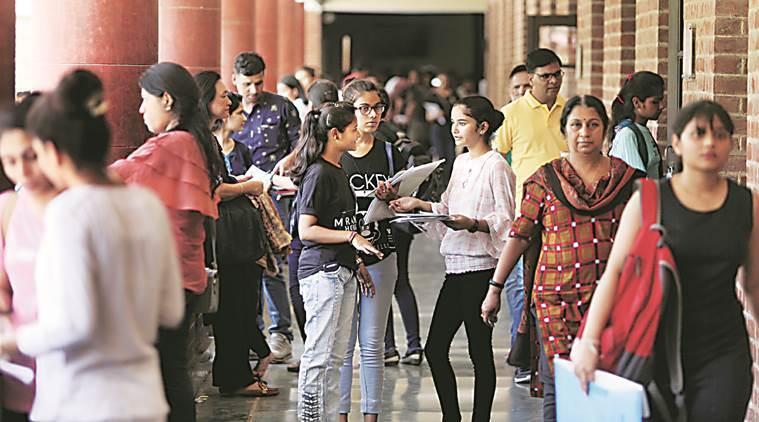Dream of Higher Education Moves Farther with Fee Hikes

Representational image.
In the context of the Jawaharlal Nehru University (JNU) students’ agitation against the fee hike—along with students from several universities across the country—the issue of rising costs of the higher education has taken centre stage. A quick analysis of the fee structures of premier technical education institutes show how they are turning into exclusive enclosures for the Indian elite. On the other hand, attempts at pursuing higher education by the poor and the marginalised are landing them in hefty education loans. NewsClick spoke with some of the students of Indian Institute of Mass Communication, National Law University and Indian Institute of Technology to understand their plight and how they cope with the emotional and psychological pressures.
***
Indian Institute of Mass Communication
Indian Institute of Mass Communication—popularly known as IIMC—was established with the aim of “contributing to human development, empowerment and participatory democracy, anchored in pluralism” in 1965. Sharing its campus with JNU, the institute offers several courses in Hindi and English Journalism, Radio and Television Journalism and Advertisement and Public Relations.
The trajectory of the fee hike in the institute clearly shows how the aspirants are finding it more and more difficult to pursue their dreams. The institute has recently increased the annual fee for English/Hindi journalism courses from Rs 79,000 to Rs 95,000, Rs 1.68 lakh for Radio and TV from Rs 1.45 lakh and Rs 1.31 lakh for Advertising and PR from Rs 1.12 lakh.
Devesh Mishra, a student of Hindi Journalism in the institute, talking to NewsClick, said that the administration is not following its rulebook while determining the fee. He said, “The rules mention that the administration can hike the fee to the tune of 10% per annum, but hike is around 22% this year. We must keep in mind that this institute is entirely funded by the central government and it is the biggest government training institute for journalism. I know several persons from the marginalised sections who could not take admissions even after they successfully passed the entrance exam and cleared the interview.”
The institute, for the first time, could not fill the seats reserved for Scheduled Castes and Scheduled Tribes this year. “To the question of implication,” he said, “We must understand that the representation of SC, ST and OBC communities is already low in the field of journalism. When you are increasing the fees, you are telling these communities that they do not deserve to be here. This is deplorable.”
Another student, Aakash Pandey, while narrating his story, said that the additional costs for students are also mounting. He said, “I managed the first instalment only after borrowing from so many people. I live in a joint family and it hardly owns two to three bighas [of land]. The first crop was destroyed, second crop was also damaged after heavy rains. The crop is still standing in stagnant water. I do not know how much returns we will get from it. I still do not know how I will pay my second instalment. I know one of my friends who may have to sell his land to pay the fee. The government must understand that affordable education is the just right of every student.”
***
National Law University
National Law Universities, popularly known as the NLUs, are state-funded institutions located in 19 states across India. NLUs were established for imparting quality legal education to the budding lawyers. However, the reality is a bit different in terms of intake and cost of education. The premier law schools run courses like BA LLB (Hons.) for five years, and the average fee for the course ranges between Rs 1,30,000 to Rs 2,02,000 per annum. For example, the fee for Maharashtra National Law University for the session 2019-20 has been pegged at Rs 2,02,000 for all India Students. As if this is not steep enough, one needs to pay Rs 90,000 additionally for hostel and mess charges. The students argue that if they add other expenses, it can reach to mind boggling figure of Rs 3,50,000 per year. So, the parents must be prepared to shell out Rs 17,50,000 for the five-year course.
NewsClick also talked to the students of Hidayatullah National Law University, which has witnessed students’ protests last year.
When Devvrat first filled the form of Common Law Admission Test to seek admission in the NLUs, he scanned through the fee structure of all the law universities to identify the cheapest among them. He found that almost every law school was costing him around Rs 2 lakh per annum. However, arranging the fee proved to be herculean task for him. He said, “My mother raised me when my parents decided to part ways. She is a lawyer but not established. For the first three years, we had to borrow from our relatives and friends. Since it’s a five-year course, not many people showed confidence in financing the studies. Thus, I had to move to banks to seek student loans. However, we did not qualify for the loan, as the value of our house was not matching the requisite eligibility. But we continued our efforts. Finally, a banker showed confidence in me after my interview and seeing my academic performance. The bank granted me the loan of Rs 3.75 lakh. Now, I need to repay it once I complete my studies.”
Also watch: JNU: Fight Between Ideologies
Another student, Pranjal, told NewsClick that the cost of education for his family is back-breaking to the extent that it amounts to almost 50% of the annual income of his household. He said, “My father is a government employee and earns nearly Rs 6 lakh per annum. My fee is around Rs 2 lakh and other expenses are around Rs 50,000 per year. My brother is preparing for civil services examinations, he too needs Rs 50,000 per year. So, my father is spending Rs 3 lakh per annum on our education only. With the debate over fee hike in JNU, I am wondering why we should pay this much fee in a public-funded institution like NLU.”
Devvrat pointed out that the institution is asking for this amount even after it gets grants from University Grants Commission, state government and central government.
Senior lawyer and Right to Education Activist Ashok Agarwal told NewsClick: “When the student is burdened with the loans worth lakhs of rupees, their first concern would be repayment of the debt. Thus, the students often prefer jobs in corporate law firms and avoid practising law. Secondly, the fee hike certainly deters sharp students from opting for law as a profession because it needs at least 10 years of practice to establish themselves. Only a few students choose this path.”
***
Indian Institute of Technology
Indian Institutes of Technology, popularly known as IITs, were established with the vision to be a partner in driving India’s growth story post independence. The institutes continued to contribute significantly in several projects of national interest. But the premier institutes are too becoming unaffordable with mounting costs. In 2016, the IIT Council, the highest decision-making body, increased the fee of B Tech programmes from Rs 60,000 to Rs 2,00,000 per month. In another controversial decision, the council increased the fee to Rs 2,00,000 for the M Tech Programme too.
A student, who requested anonymity, said that the students who are not from well-off families tend to apply for students’ loans. So, the students passing B Tech are generally concerned with paying their loans first. But many students also prefer academics and research over jobs. The fee hike will deter these students and will certainly hamper research for the public good in the long run.
Also read: From Kerala to Mizoram, JNU Students Get Overwhelming Support Against Fee Hike
Get the latest reports & analysis with people's perspective on Protests, movements & deep analytical videos, discussions of the current affairs in your Telegram app. Subscribe to NewsClick's Telegram channel & get Real-Time updates on stories, as they get published on our website.
























